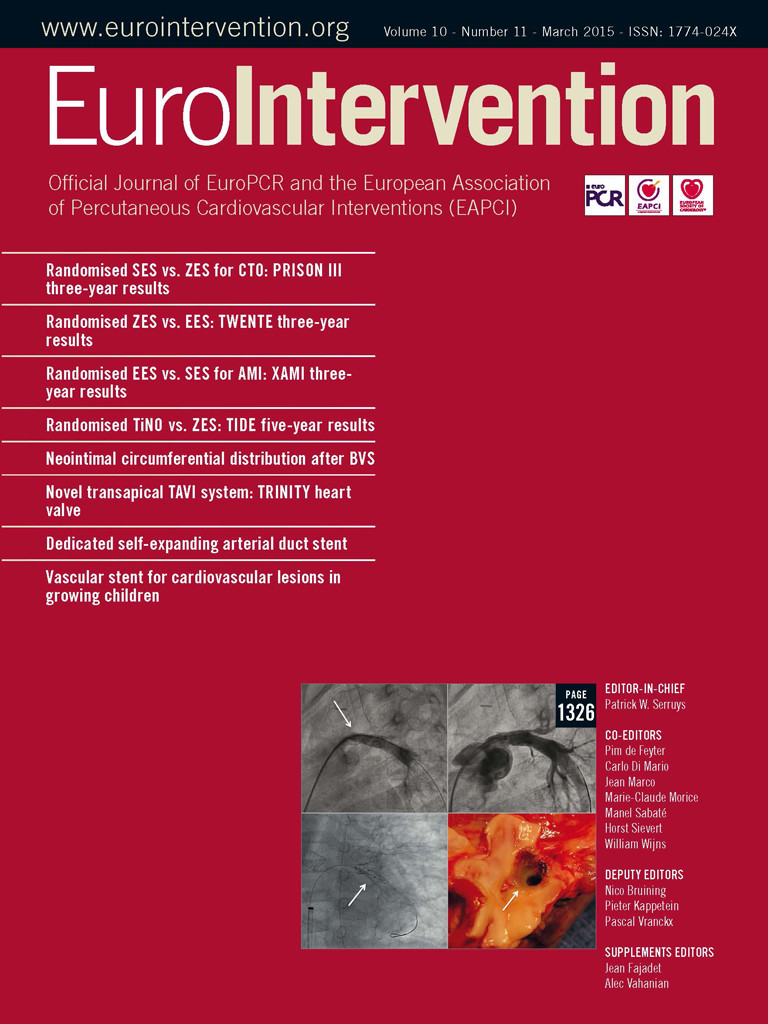NEWS
■ The EAPCI Fellows Course will take place on the 19th and 20th of June at the Heart House, Sophia Antipolis, France. Covering all the core subjects in the interventional cardiology syllabus, it is aimed at medical doctors who have started or have recently completed a programme of training.
■ Also at the European Heart House, the 2015 EAPCI Summit on 23rd March is the yearly meeting for the Presidents and Representatives of the National Interventional Working Groups who will exchange ideas and projects this year focusing on “Mapping Interventional Cardiology in Europe”.
EAPCI Focus on the Interventional Cardiology Working Group of The Netherlands Society of Cardiology (NVVC)
An interview with the President, René J. van der Schaaf
What does the EAPCI membership mean for a national society?
The EAPCI, and in particular their professional documentation, have been helpful for us in developing our own guidelines for operator and institutional requirements here in The Netherlands. EAPCI documentation and recommendations for training fellows have been instrumental in helping us create our own version, an adapted document which was only agreed upon last year. An example of one of the adaptations, something we changed from the original EAPCI documentation, is to mention the difference between off-site and on-site cardiac surgery with a Heart Team. We feel strongly that the largest part of fellowship training should take place at an on-site cardiac surgery site. With this in mind, we agreed that in The Netherlands only a maximum of six months of training can be spent off-site.
What are the current issues related to the national society?
Although the Dutch Ministry of Health does not recognise the accreditation we have devised for our subspecialty, nonetheless they do use it for their quality control and regulatory purposes. The subspecialty of interventional cardiology as such is not recognised by the Dutch Ministry of Health, since the recognition procedure is managed by our National Cardiac Society. In The Netherlands you are registered both as a cardiologist and as an interventionalist, and the Cardiac Society performs quality control checks for both institutions as well as for members of our Working Group. An interventionalist must perform at least 150 procedures per year to maintain his/her subspecialty status. Furthermore, there are specific institutional requirements. For example, you need at least two interventional cathlabs and four operators per interventional site. In practice, this means that the lowest PCI threshold is set at 600 PCIs per year. We strongly believe that the relationship between PCI volume and experience is very important. We also take account of the whole chain of care, for instance, the specialist role of the CCU/ICUs in providing care based on the available evidence. This is one of the primary reasons why we have set the threshold at 600 PCIs. Currently, we have 30 qualified sites which care for 16.8 million inhabitants. These 30 sites are divided into 14 on-site and 16 off-site locations. No sites exist under this 600 threshold, as to be under this lower limit entails the withdrawal of a site’s recognition and licence. This is a very important element of our official exchanges with the Dutch Ministry of Health. The quality control audits are performed at least every four years and naturally our Working Group plays a key role in performing them. The audits themselves are a form of peer review. For instance, when a certain site is failing to meet the threshold or demonstrates dysfunction for whatever reason, we speak with the institution, engaging its board of directors as well as the cardiology staff. Sites generally do not tend to challenge our Working Group because the members feel that this is a very sensible and reasonable minimum standard to which they need to adhere. With 30 cathlabs in The Netherlands each maintaining high standards of care, experience and efficiency, we have seen that patient outcomes are usually better, especially in high-volume sites.
Like other national Working Groups, the creation and management of a national database is a challenging element of our work. In The Netherlands, this is a hot topic as we are attempting to move from retrospective to prospective data entry. The NVVC has established the National Cardiovascular Data Registry (NCDR) as an independent foundation with the aim of creating clinical registries as well as measuring and improving the quality of care for cardiac patients. The NCDR board is responsible for all organisational and regulatory aspects. Besides the NCDR, we have another project in The Netherlands called “Value Based Healthcare”, a scientifically based programme measuring patient relevant outcome corrected for initial conditions in a physician driven and patient centred fashion in order to improve quality of care and transparency in the participating cardiac centres. In addition, both these initiatives are very important to us with respect to the current discussions on reimbursement.

René J. van der Schaaf, President of the Intervention Cardiology Working Group of The Netherlands Society of Cardiology
![]()
President: René J. van der Schaaf
Past President: Jan J. Piek
Contact details: [email protected]
Working Group website: www.nvvc.nl/commissies-werkgroepen/Werkgroep+Interventie+Cardiologie
Upcoming biannual meetings: spring, autumn
Founded: 1977 (NVVC)
Members: 1,668 (NVVC) 127 (Working Group)
EAPCI members: 104

